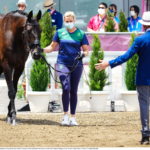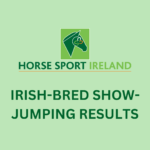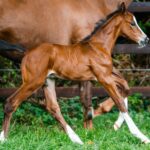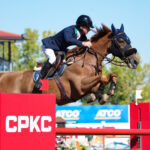Important notice to all stakeholders on obligations regarding EVA vaccination and the consequences of positive results
- 14 October 2019, 19:10
The Department of Agriculture Food and The Marine (DAFM) have issued an important update on Vaccination against Equine Arteritis Virus (EAV) and an update on the recent outbreaks in the UK.
Equine Arteritis Virus (EAV), the causative agent of the disease Equine Viral Arteritis (EVA), circulates widely on continental Europe. There is an ongoing and persistent risk that it will be introduced into Ireland. For this reason, vaccination of breeding stallions is highly recommended and facilitated under special license from the Department of Agriculture, Food and the Marine (DAFM). The inactivated vaccine “EQUIP ARTERVAC” (manufactured by Zoetis and imported by C&M Vetlink Plc.) is currently licenced on the
Irish market. Relevant industry Codes of Practice and manufacturer’s guidelines strongly advise that both thoroughbred and non-thoroughbred stallions, including sport-horses, standard-breds and ponies receive a primary vaccination course and a booster every six
months
Earlier in 2019, due to restricted availability, vaccine was reserved for breeding stallions and was not being released for teasers. Due to recent increased availability, it is now available for teasers on application.
Dermot Forde, FEI National Head Veterinarian for Ireland said:
“Equine Viral Arteritis (EVA) would be an extremely damaging disease for the Irish equine industry and for the individual breeding farm(s) concerned should it be diagnosed in Ireland, where, thankfully, it has not been since 2010. However the increased international movement of horses (and semen) increases the risk of an outbreak, given that EVA is present in several Continental countries and has been diagnosed in five Sport Horse Stallions in Great Britain in 2019.
“It is therefore vital that Irish breeders should take all recommended steps to prevent such an occurrence. With this in mind, it is highly recommended that, where appropriate, all actively breeding stallions be blood tested and vaccinated against EVA every 6 months, using the approved, inactivated vaccine that is currently licenced in Ireland. In this regard, it is vital that breeders consult their veterinary surgeon for their expert advice. Additionally, anyone contemplating the importation of a stallion or a mare for breeding from any country where EVA has been recently identified, should have such horses blood tested in accordance with recommended procedures. Importation of equine semen should be based on laboratory evidence and certification of freedom from EVA infection.”
Situation with EAV in Ireland and the UK
The last confirmed case of EAV infection in Ireland was in 2010. During April and May this year, UK authorities reported four cases of EAV infection in non-thoroughbred stallions. These cases occurred on closely linked premises in Dorset and Devon. In July, a further unrelated outbreak of the disease was confirmed in a fifth non-thoroughbred stallion in Shropshire, who was subsequently castrated. Based on the information available to the UK authorities, none of the affected stallions had been vaccinated against EAV.
EAV vaccine usage – Ireland
DAFM figures for 2019 to date indicate that there is suboptimal usage of the EAV vaccine in the Irish thoroughbred stallion population. Additionally, no vaccine applications have been received for any Irish non-thoroughbred stallions. This suggests that industry
guidelines are widely not being adhered to and that a significant number of stallions are not being vaccinated.
Equine Industry Responsibility
The onus is on the Irish equine industry to protect the horse population, to lead on this matter and to actively engage with its members to ensure the uptake of this vital vaccine. Furthermore, it is the responsibility of industry to provide accurate figures to
the manufacturers of this vaccine on the ongoing requirements for the Irish market.
Vaccines Supply
Although there have been issues with vaccine supply in recent years, a significant stock of “EQUIP ARTERVAC” is currently available. Please be aware that the EAV vaccine is produced by the manufacturers in very limited quantities as overall EU requirements are low. It is essential that industry provides accurate information regarding the numbers that will be required for the Irish market so that manufacturers can continue to match that requirement. The manufacturers have indicated that there is little margin for error without wastage of this short shelf-life product. In March 2019, 400 doses of the vaccine were imported. However due to the relatively low uptake to date, there is a risk that this stock will not be used before it reaches its expiry date on 3rd December 2019. This will result in a financial loss being incurred by the importing company, which is likely to affect future supply to the Irish market.
Vaccine application details, guide to completion and forms for the testing of equine samples within DAFM are available HERE
Further information on EVA is available in HERE
- Popular

- Latest




























